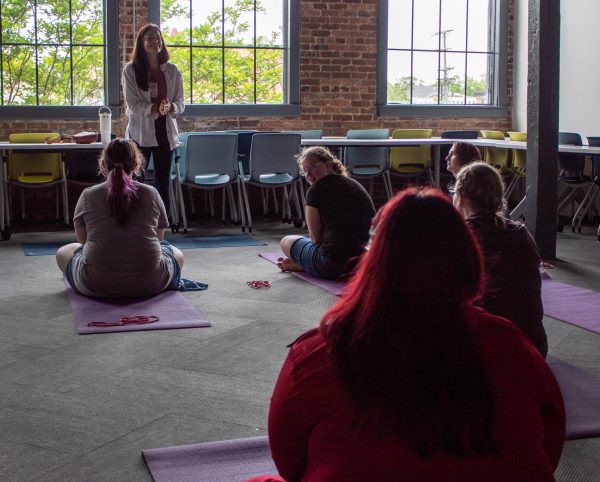UNA clinics administers Moderna vaccine
April 22, 2021
In March, the University of North Alabama began administering doses of Moderna’s COVID-19 vaccine on campus. These clinics were held in the Guillot University Center (GUC) on March 15, 16 and 18 as well as on April 12, 13,17 and 18.
The allocation of the vaccine doses was determined by the guidelines put in place by the Alabama Department of Public Health for distribution of the vaccine. The clinic began during phase 1b, allowing for UNA faculty and staff to be vaccinated.
Recipient Jada Latham is both a UNA sophomore and residential assistant on campus, allowing for her to receive the vaccine.
“Being able to get the shot due to my position definitely put my mind at ease, knowing that I am protecting myself and the community,” Latham said.
The Moderna vaccine is being distributed as opposed to its competitors, Pfizer and Johnson & Johnson, because it was given to the university based on the ability for it to be stored at the correct temperature.
Although many who have received the vaccine thus far are affiliated with UNA, the vaccine is available to anyone in the community.
Vaccines were not set aside for staff and faculty, and instead were available to all on a first-come first-serve basis by appointment.
No exceptions were made to the phases presented by the ADPH by the university. Those that live in residence halls and play on sports teams did not receive doses before their time in the phase, and even then, only received them on an appointment basis.
When asked about the ratio between those affiliated and non-affiliated with UNA who had received doses so far, Director of University Health Services, Sheena Burgreen said, “This number changes on a daily basis. We do not have preliminary data available, but we are putting systems in place that will allow us to run data analyses.”
Since the first round of clinics until the end of April, 3,889 doses of the Moderna vaccine have been administered.
In this unprecedented time, when many have never been vaccinated outside of regular childhood immunizations, it is important to make recipients feel comfortable in their experience.
“I would say that the experience was definitely something different, but if it helps me and others around me, I’m all in,” Latham said. “I would rate it a definite ten out of 10.”
Another factor that makes UNA’s vaccine clinics unique is the help from senior students of the Anderson College of Nursing. Student nurses who are helping to administer vaccines are upcoming graduates who have passed their clinical exams.
Individuals who received their first dose in March are now returning to get their second shots, although they are not required to get their second shot at the university if that is where they received their first shot.
“This is difficult to predict because individuals do not have to come back to UNA to receive their second dose and may choose to get this dose at an alternate location,” said Burgreen, when asked about the success rate of clinic patients coming back for their second dose. “UNA has given some individuals their second dose when they received their first dose elsewhere.”
At each clinic held so far, 400 doses have been administered at each one.
The last two dates for the clinic are May 11 and 15 from 7 a.m. to 5 p.m.
Vaccinations became available to all Alabama residents who were ages 18 and up on April 5. However, it was announced by United States President Joseph Biden on April 19 that all citizens 16 and older are able to get vaccinated, meaning the last two clinic dates are open to anyone.
“You do not have to have insurance to get a vaccine,” Burgreen said.
Appointments can be made at www.una.edu/healthservices and receive more information about the Moderna vaccine at cdc.gov.











